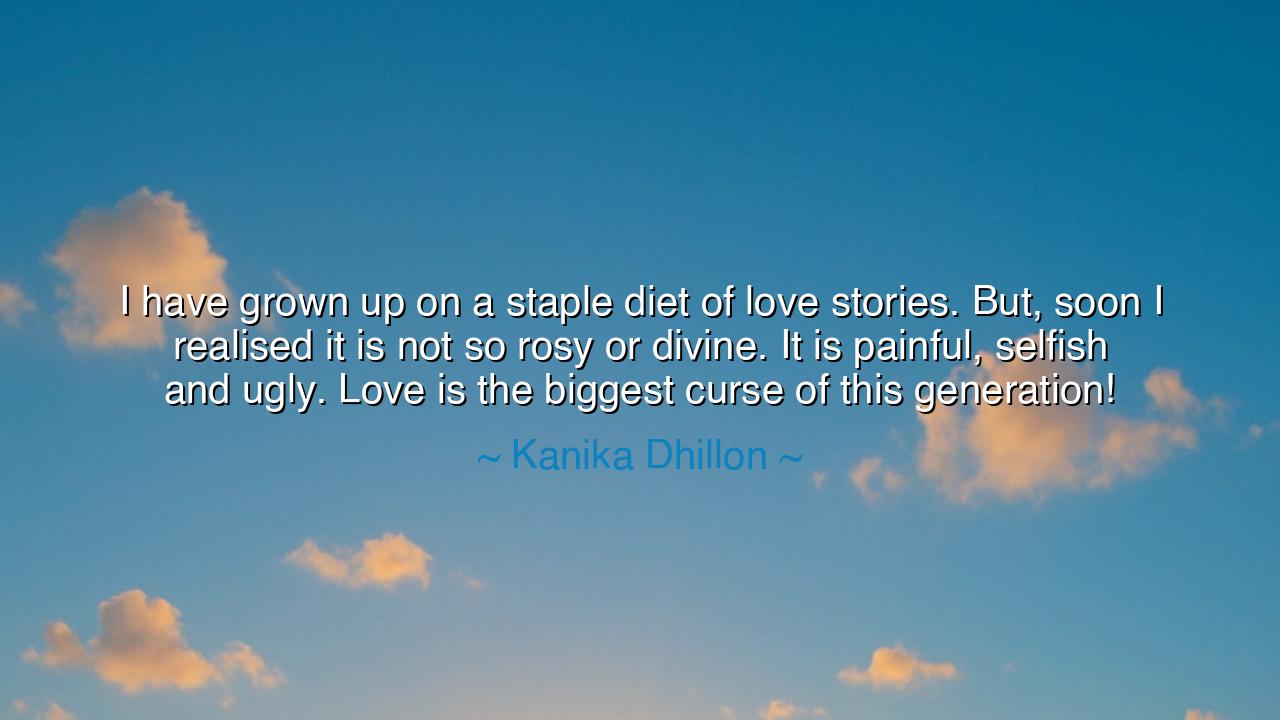
I have grown up on a staple diet of love stories. But, soon I
I have grown up on a staple diet of love stories. But, soon I realised it is not so rosy or divine. It is painful, selfish and ugly. Love is the biggest curse of this generation!






In the lament of Kanika Dhillon, there echoes the sorrow of a soul that has seen behind the veil of illusions: “I have grown up on a staple diet of love stories. But soon I realised it is not so rosy or divine. It is painful, selfish, and ugly. Love is the biggest curse of this generation!” These words strike like thunder after a long calm, for they come not from bitterness alone, but from revelation — from the awakening of one who has tasted both the sweetness and the poison of the same cup.
From time immemorial, humankind has worshiped love as both god and tyrant. The poets of old called it divine — Eros, who bound the gods and men alike in chains of desire; Cupid, whose arrows pierced without mercy. Yet every tale of love’s glory ends in shadow. Think of Helen and Troy, whose beauty set a thousand ships ablaze, and whose passion drowned kingdoms in blood. The ancients knew — what the moderns have forgotten — that love is not gentle. It is fire, and fire does not caress; it consumes. To call love divine is to forget that even gods are cruel in their lessons.
Kanika speaks as one awakened from a dream — the dream fed to her, as to many, by a staple diet of stories that promise perfection, devotion, and eternal bliss. These tales are the sweet wine of youth, intoxicating and radiant. But as time unveils truth, the wine turns bitter, and one sees that love, in its mortal form, is far from the shimmering fantasy. It is selfish, for each heart seeks its own reflection; it is painful, for no two souls can ever fully meet; and it is ugly, for the purity we imagine is often stained by desire, jealousy, and fear.
This curse of the generation, as she names it, is not love itself — for love, in its truest essence, remains sacred — but the illusion of love that this age worships. A generation raised on screens and stories has mistaken possession for passion, attention for affection, and validation for devotion. Where once love was a journey of growth, it has now become a marketplace of need. Thus the people, in chasing the shadow, lose the substance — and the fire that could have purified them, burns them to ash instead.
Yet there is wisdom in this sorrow. The ancients too walked this path. Recall Euripides’ Medea, who, betrayed by the man she loved, was driven to ruin and vengeance. Her tragedy is not only her rage, but her blindness — her belief that love was divine, invincible, and owed her joy. The lesson is clear: love without understanding becomes bondage, and passion without wisdom becomes poison. The pain Kanika speaks of is not a condemnation of love, but a call to see it clearly, to strip it of the illusions that make it monstrous.
To the listener, then, let this serve as a teaching: love not as the world teaches you, but as truth demands. Do not seek completion in another, for the heart that is empty cannot be filled from without. Do not call love divine unless you are willing to endure its crucible, for it will demand your ego, your comfort, and your peace before it gives you wisdom. Love is not a rose garden, but a field of thorns — and only those who walk it barefoot, in courage and humility, find its fragrance untainted.
If this generation is cursed, it is only because it has forgotten how to suffer rightly for what is sacred. Love, to be pure, must first burn away the selfishness within us. It must shatter illusions before it grants truth. And truth, though painful, is the highest form of beauty. So love — but love as the ancients did: not for pleasure, not for validation, but for transformation. Let love be the fire that refines you, not the chain that binds you.
For in the end, as Kanika’s lament becomes a lesson, we learn that love is both curse and blessing, both shadow and light. It destroys the false so that the real may be born. And when the illusions fall away, what remains is not the rosy dream — but the raw, eternal flame of the soul, which no disappointment can extinguish.






AAdministratorAdministrator
Welcome, honored guests. Please leave a comment, we will respond soon